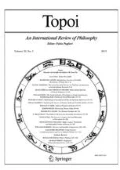Abstract
Christians traditionally hold that we know God as God is revealed to us, but that we do not know God in essence, as God is in himself. But that raises the question of whether God as revealed (GR) accurately represents God’s essence (GE). Perhaps, given our cognitive limitations, God logically cannot reveal the divine essence to us. Or perhaps God knows that it would not be good for us were he to do so. Descartes raised the possibility that God is an Evil Genius who systematically misleads us. This paper explores several attempts to build a bridge from GR to GE. All appear to have serious limitations. It concludes that, contrary to much of the tradition, GR does (in part) reveal God’s essence to us.
Similar content being viewed by others
Notes
A similar point is often made via the distinction between the “immanent Trinity” and the “economic Trinity”.
The distinction between GE and GR is in some ways similar to the famous distinction make (in an entirely different context) by Kant between the noumenon (the thing as it is in itself, which we cannot know) and the phenomenon (the thing as we experience it) (see Kant 1965, pp. 74, 87, 149). But I should state that I am not raising a general epistemological question (e.g., “How do we know that the pencil as we experience is the way the pencil really is?”) but an issue that emerges from the specifically Christian notion of God.
For the sake of clarity, let me note here three important areas that I am not going to explore in the present paper: (1) I will not explore revelations or purported revelations in the context of others religions beside Christianity, although I suspect the question I am asking can be raised in many of those contexts too; (2) I am going to pretend that what has been revealed by God about God (i.e., GR) is all of a piece; that is, I will ignore the fact that most theologians hold that revelation via God’s deeds and words in history is progressive; (3) I will not explore the fascinating question of theological predication, i.e., whether we can speak of God only negatively, or analogically, or even unequivocally; this despite the fact that the question of predication is closely related to the issue that I am considering.
I owe this point to Professor Scott Cormode.
References
Aquinas T (1955) Suma contra gentiles. University of Notre Dame Press, Notre Dame
Barth K (1975) Church dogmatics I. 1. T. & T.Clark, Edinburgh
Bouwsma OK (1965) Descartes’ evil genius. In: Sesonske A, Fleming N (eds) Meta-meditations. Wadsworth, Belmont
Calvin J (1955) The Institutes of the Christian Religion. The Westminster Press, Philadelphia
Descartes R (1970) The philosophical works of descartes I. Meditations on first philosophy I. Cambridge University Press, Cambridge
Hick J (1957) Faith and knowledge. Cornell University Press, Ithaca
Kant I (1965) The critique of pure reason, translated by Norman Kemp Smith. St. Martin’s Press, New York
Luther M (1961) Selections from his writings, ed. by John Dillenberger. Anchor Books, Garden City
Nicholas of Cusa (1928) The vision of God. E. P. Dutton & Sons, New York
Torrance TF (1996) The Christian Doctrine of God. T. & T. Clark, Edinburgh
Unknown (2004) The cloud of unknowing. HarperOne, New York
Acknowledgments
I would like to thank Professors Marilyn Adams, Ellen Charry, Scott Cormode, Ryan Falicioli, Christine Helmer, Anselm Min, Alan Padgett, Will Power, and Eric Yang for their helpful comments on an earlier version of this paper. I would also like to thank the participants in the 2010 Claremont Philosophy of Religion Conference.
Author information
Authors and Affiliations
Corresponding author
Rights and permissions
About this article
Cite this article
Davis, S.T. Divine Incomprehensibility: Can We Know The Unknowable God?. Topoi 36, 565–570 (2017). https://doi.org/10.1007/s11245-016-9397-9
Published:
Issue Date:
DOI: https://doi.org/10.1007/s11245-016-9397-9




